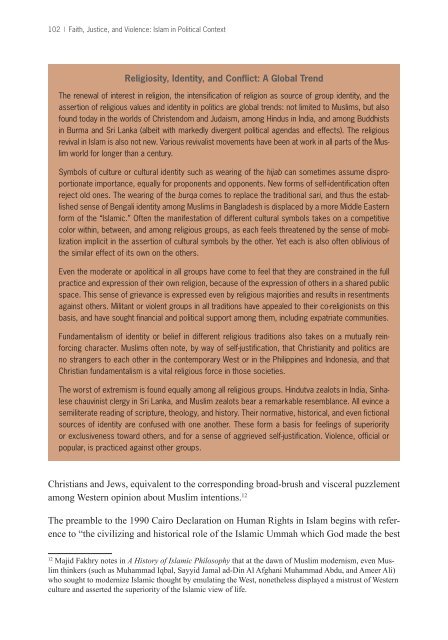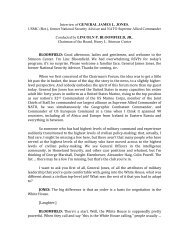Islam and Politics - The Stimson Center
Islam and Politics - The Stimson Center
Islam and Politics - The Stimson Center
You also want an ePaper? Increase the reach of your titles
YUMPU automatically turns print PDFs into web optimized ePapers that Google loves.
102 | Faith, Justice, <strong>and</strong> Violence: <strong>Islam</strong> in Political Context<br />
Religiosity, Identity, <strong>and</strong> Conflict: A Global Trend<br />
<strong>The</strong> renewal of interest in religion, the intensification of religion as source of group identity, <strong>and</strong> the<br />
assertion of religious values <strong>and</strong> identity in politics are global trends: not limited to Muslims, but also<br />
found today in the worlds of Christendom <strong>and</strong> Judaism, among Hindus in India, <strong>and</strong> among Buddhists<br />
in Burma <strong>and</strong> Sri Lanka (albeit with markedly divergent political agendas <strong>and</strong> effects). <strong>The</strong> religious<br />
revival in <strong>Islam</strong> is also not new. Various revivalist movements have been at work in all parts of the Muslim<br />
world for longer than a century.<br />
Symbols of culture or cultural identity such as wearing of the hijab can sometimes assume disproportionate<br />
importance, equally for proponents <strong>and</strong> opponents. New forms of self-identification often<br />
reject old ones. <strong>The</strong> wearing of the burqa comes to replace the traditional sari, <strong>and</strong> thus the established<br />
sense of Bengali identity among Muslims in Bangladesh is displaced by a more Middle Eastern<br />
form of the “<strong>Islam</strong>ic.” Often the manifestation of different cultural symbols takes on a competitive<br />
color within, between, <strong>and</strong> among religious groups, as each feels threatened by the sense of mobilization<br />
implicit in the assertion of cultural symbols by the other. Yet each is also often oblivious of<br />
the similar effect of its own on the others.<br />
Even the moderate or apolitical in all groups have come to feel that they are constrained in the full<br />
practice <strong>and</strong> expression of their own religion, because of the expression of others in a shared public<br />
space. This sense of grievance is expressed even by religious majorities <strong>and</strong> results in resentments<br />
against others. Militant or violent groups in all traditions have appealed to their co-religionists on this<br />
basis, <strong>and</strong> have sought financial <strong>and</strong> political support among them, including expatriate communities.<br />
Fundamentalism of identity or belief in different religious traditions also takes on a mutually reinforcing<br />
character. Muslims often note, by way of self-justification, that Christianity <strong>and</strong> politics are<br />
no strangers to each other in the contemporary West or in the Philippines <strong>and</strong> Indonesia, <strong>and</strong> that<br />
Christian fundamentalism is a vital religious force in those societies.<br />
<strong>The</strong> worst of extremism is found equally among all religious groups. Hindutva zealots in India, Sinhalese<br />
chauvinist clergy in Sri Lanka, <strong>and</strong> Muslim zealots bear a remarkable resemblance. All evince a<br />
semiliterate reading of scripture, theology, <strong>and</strong> history. <strong>The</strong>ir normative, historical, <strong>and</strong> even fictional<br />
sources of identity are confused with one another. <strong>The</strong>se form a basis for feelings of superiority<br />
or exclusiveness toward others, <strong>and</strong> for a sense of aggrieved self-justification. Violence, official or<br />
popular, is practiced against other groups.<br />
Christians <strong>and</strong> Jews, equivalent to the corresponding broad-brush <strong>and</strong> visceral puzzlement<br />
among Western opinion about Muslim intentions. 12<br />
<strong>The</strong> preamble to the 1990 Cairo Declaration on Human Rights in <strong>Islam</strong> begins with reference<br />
to “the civilizing <strong>and</strong> historical role of the <strong>Islam</strong>ic Ummah which God made the best<br />
12<br />
Majid Fakhry notes in A History of <strong>Islam</strong>ic Philosophy that at the dawn of Muslim modernism, even Muslim<br />
thinkers (such as Muhammad Iqbal, Sayyid Jamal ad-Din Al Afghani Muhammad Abdu, <strong>and</strong> Ameer Ali)<br />
who sought to modernize <strong>Islam</strong>ic thought by emulating the West, nonetheless displayed a mistrust of Western<br />
culture <strong>and</strong> asserted the superiority of the <strong>Islam</strong>ic view of life.

















